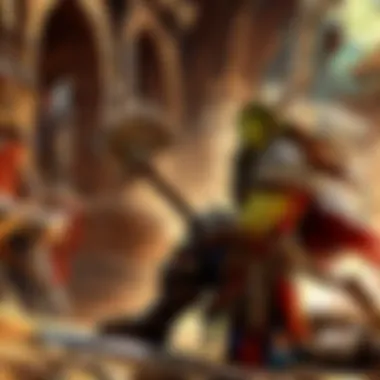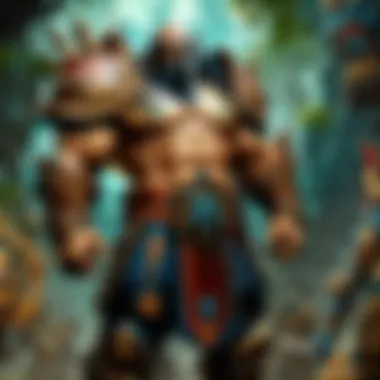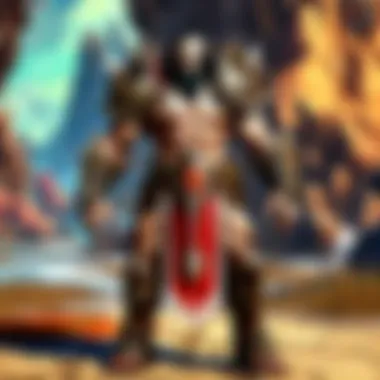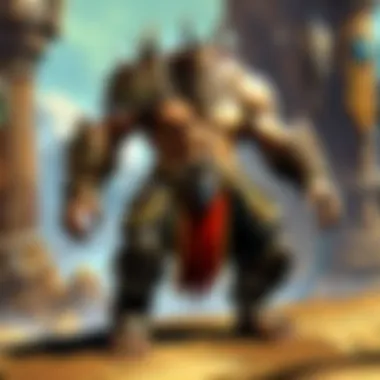Exploring Quest Competitions in World of Warcraft


Intro
Quest competitions within the World of Warcraft universe represent an intriguing and vital part of the gameplay experience. Gamers often engage in these friendly yet competitive endeavors not only to achieve personal milestones but also to connect with others in the community. This section will elaborate on key elements surrounding quest competitions and their critical influence on gameplay dynamics.
Game Updates and Patch Notes
Overview: Staying abreast of updates is essential for participating in quest competitions effectively. Blizzard often releases new patches and updates that tweak gameplay elements, including quest structure, difficulty levels, and competition formats. By keeping informed, players can adapt their tactics accordingly, ensuring they remain competitive.
Patch Highlights: Recent critical updates may introduce new quests or modify existing ones. They can add leaderboards, time limits, or unique rewards for winners. Knowing the highlights allows players to identify features that could give them an edge in competitions.
Impacts: Each update influences how players perceive quest challenges and adjust their strategies. A major rework of a favored quest may lead to new strategies developing or the entire competition landscape shifting. The adaptation required to maintain competitive standing can elevate the gaming experience considerably.
Strategy Guides and Tips
Class Strategies: Understanding how different classes can reach their maximum potential is essential in quest competitions. Players should alike familiarize themselves with the strengths and weaknesses of their chosen classes, tailoring their strategies to effectively navigate challenges. For instance, a Mage might excel in AoE spells against multiple foes, while a Paladin may be adept at absorbing damage in single-target encounters.
Campaign Walkthroughs: Completing quests and navigating through competitions often require detailed knowledge of the pathways taken and the objectives achieved. Step-by-step guides can be invaluable for learning effective approaches to different quest types — know routes that are optimal and understanding NPC interactions can separate the top competitors from everyone else.
PVP Tactics: For those who enjoy player-versus-player challenges within quest competitions, applying tactics unique to combat situations is critical. Insights into battleground strategies and arena mechanics can enhance a player's effectiveness. Familiarity with environment behavior walls and vantage points can often be the determinative factor in turning the tides in close encounters.
Lore and Story Analysis
History Deep Dive: The historical narrative of World of Warcraft adds depth to quests, making competitions not only about the present gaming mechanics but also about the legacy their characters and environments represent. Understanding these stories can enrich players' engagement and likely enhance their experiences during competitions.
Current Storyline: In active quest competitions, being aware of current story arcs impacts contexts in which players are fighting. Changes in lore can shift alliances, redefine quests, and alter the competitive landscape, thus demanding players remain updated on game developments.
Character Profiles: Iconic figures within the game's universe can provide compelling motivations for competitions. Knowing key characters, their skills, and personas helps players devise effective tactics while enhancing their gameplay engagement.
Mod Reviews and Add-ons
Popular Mods: Incorporating mods and add-ons into gameplay can improve users' experiences considerably. User interface enhancements permit better management of quests and information while also promoting participatory elements unique to the competitions themselves.
User-Generated Content: Many players create mods and tools intended to enhance community competitions. If utilized well, these resources can yield significant improvements in ability, agility to perform within quests, and overall coordination with other players.
Installation Guides: Additionally, learning how to configure and install mods ensures players can personalize their WoW experience to best suit their needs as competitors in questing. Ultimately, it is key that players educate themselves and continue evolving within the immersive environment.
Mastery of both gameplay strategies and understanding quest complexities empowers players, establishing preeminent contenders.
Understanding Quest Competitions
Quest competitions in World of Warcraft are more than mere activities; they embody deeply ingrained aspects of gameplay. Understanding these competitions is crucial for anyone who wishes to fully appreciate the complexities of this immersive environment. From player strategy to community dynamics, these competitions influence how gamers interact with the game and each other. An understanding of quest competitions can enhance players’ gameplay experiences significantly and each facet warrants thorough exploration.
Definition of Quest Competitions
Quest competitions refer to organized challenges within World of Warcraft where players complete quests under certain conditions to achieve specific goals. These can involve speed runs, completion of various objectives, or accumulating the most points. Regular quests may lead into these competitions, allowing a seamless transition from casual play to intense gaming. This blend serves to make gameplay more competitive while still promoting enjoyment derived from successe.
The key characteristic that distinguishes a competition is the element of rivalry. Players might strive against each other to clear quests faster or efficiently, possibly limiting their resources while doing so. These conditions push players to their limits, testing skills like planning, resource management, and decision-making. Without a clear elavation of player conduct through defined competition, the ongoing dynamics of World of Warcraft gameplay would lack sufficient engagement.
Historical Context
The historical context of quest competitions in World of Warcraft reveals an evolution distinct from typical quest designs. Initially, the game focused predominantly on PvE, or Player versus Environment features, where interactions were linear. Players tackled quests as individuals or in casual teams, often without time constraints.
However, with the increasing demand for competitive gaming,-game developers recognized a need to incorporate elements that could appeal to higher levels of competitive engagement among players. Thus, quest competitions emerged around several expansion packs, with the most significant shifts occurring post the introduction of the Wrath of the Lich King expansion.
Features like Heroic Mode quests started to engage players to not just complete quests, but to beat them in time-critical situations. Event-style quests, introduced for seasonal events or expansions, further contributed to this heightened competition.
The advent and growth of sub-communities organized around these competitions in devoted player forums such as reddit.com reflects their mathematical impact on game culture. These platforms continue to encourage engagement and discussion surrounding the nuances of competition, creating an ever-growing network of enthusiasts inspiring each other to participate and compete.


_
Formats of Quest Competitions
Quest competitions in World of Warcraft display diverse formats that significantly enrich the gameplay experience. These formats cater to different playstyles and preferences, allowing players to engage in ways that reflect their capabilities and interests. Understanding these formats is crucial for players looking to maximize their enjoyment and skill in competitions.
Solo Competitions
Solo competitions in WoW present distinct challenges. Players embark on individual quests, sometimes competing to complete them the fastest. This format allows players to demonstrate their personal skills and knowledge of the game mechanics. It requires strategy, quick decision-making, and intimate familiarity with the game's geography. Moreover, solo competitions often encourage players to refine their ability to manage in-game resources, such as health potions and cooldowns, as they tackle hard tasks alone. The solitary aspect can heighten focus, allowing dedicated players to outshine others who might excel in team settings.
Group Competitions
Group competitions shift the dynamic of questing into a collective realm. These require coordination and cooperation among multiple players. In this format, success relies on each member’s roles, whether as a tank, healer, or damage dealer. Communication becomes integral, impacting the strategy for tackling tougher quests. Players must not only master their own skills but also learn how to synergize with their teammates. Effective team dynamics greatly enhance performance in group challenges, as equal contributions can notably improve rewards and experience gained. Thus, collaboration strengthens community ties while fostering competitive encounters.
World Events and Seasonal Competitions
World events and seasonal competitions add unique and time-sensitive elements to questing. These competitions typically involve limited-time quests that celebrate milestones or game updates, creating an engaging narrative and fostering player interest. Each season might bring fresh quests or challenges that compel players to adapt their techniques or better their skills due to restricted time availability. Community participation increases during these events, fostering a lively atmosphere as players come together in celebration of shared objectives. This format specifically targets broadened community involvement, where the thrill of urgency drives many to participate wholeheartedly.
Key Takeaway: Formats of quest competitions offer players the chance to engage on individual or group levels, enriching both personal skillsets and community interactions in the game.
Overall, each format of competition brings something valuable to the experience in World of Warcraft, highlighting diverse skills, player preferences, and the essence of cooperative engagement. Understanding these formats allows players to decide their preferred realm of competition, enhancing both their skills and overall enjoyment.
Role of Strategy in Quest Competitions
Strategy plays a pivotal role in the realm of quest competitions within World of Warcraft. Successful participants know that mere participation is not enough; calculating every move can determine success or failure. Various elements like preparation, time management, and team dynamics become crucial for gaining an advantage.
Preparation and Planning
Effective preparation begins with understanding the objectives and challenges presented by the competition. Players must analyze the quest requirements, including enemy types and geographical layout. This analysis facilitates informed decision-making.Furthermore, assembling a varied team often enhances capability. For instance, a combination of tank, healer, and damage-dealer allows for flexible responses to critical situations.
Players should research strategies from previous competitions. Websites like reddit.com and facebook.com often feature discussions and insights from experienced players. Familiarity with different strategies can help new competitors anticipate challenges and devise effective plans.
In addition, proper gear selection is paramount. Acquiring or crafting the most effective gear can enhance performance significantly. A well-planned inventory also helps. Players must prioritize items that boost their chosen roles. Eventually, a thorough preparation expedition can yield improved pursuit of objectives.
Time Management
In a fast-paced game like World of Warcraft, time management can serve as a decisive victory factor in quest competitions. Players are often timed when completing various challenges, so efficiency becomes essential. Flagrantly gauging the pacing of a quest can drastically alter outcomes.
It is wise for players to develop a realistic timeline for quest completion. Mapping the key sections can streamline the progression and minimize wasted efforts. Establishing specific milestones throughout the competition ensures that players remain agile.
Utilizing in-game tools or third-party applications for tracking time acts as an extra layer of efficiency. Adjusting strategies based on time left is vital and can furnish an edge over opponents.
Team Dynamics in Group Challenges
In group competitions, building effective team dynamics is central to thriving. Team collaboration enables players to synergize their strengths while covering their weaknesses. Open communication often empowers strategic adjustments during gameplay.
It is recommended that players have distinct roles aligned with individual skill sets. Hence, a balanced approach with specified jobs can facilitate smoother operation. Team Voice Chat programs or in-game communication features help ensure signals are clear and respond swiftly to threats.
Also, conflict resolution is equally important. Managing disputes without disrupting competition flow can be vital. Establishing a delegate or leader within the team can help amicably solve differences and sustain progress. An adaptable mindset amongst team members can often bolster the group's resilience to challenges.
Overall, strategic preparation, astute time management, and thriving team dynamics are paramount facets of quest competitions in World of Warcraft. Adjustments based on these factors can enhance success and ultimately elevate the competitive experience.
Impact on Player Engagement
The concept of quest competitions in World of Warcraft extends beyond mere gameplay mechanics. They fundamentally reshape how players interact with the game and each other. Quest competitions enrich player engagement through distinct elements such as community building, motivation, and the dynamics of teamwork.
Playing in a competitive environment incentivizes players to formulate new strategies. This higher level of interaction among gamers encourages players to form partnerships or alliances with others. Also, these interactions often lead to finding new friends, expanding social networks, and creating memories within virtual landscapes.


Enhancing Community Interaction
Quest competitions serve as a focal point for community interaction. Players are more likely to engage with one another when they share common objectives or challenges. This shared struggle not only promotes healthy rivalry but can also lead to long-lasting friendships within the World of Warcraft ecosystem.
The desire to succeed in competitions propels players towards collaboration. This collaboration can manifest in various forms, including cooperation to complete quests, sharing tips, or strategizing for upcoming challenges. The communal experience can heighten enjoyment and lead to more immersive gameplay.
In essence, participatory events contribute significantly to a more vibrant community. Players come together online, and actions taken within the game lead to tangible links outside it, such as social gatherings on Reddit or Discord.
Benefits of Enhance Interaction
- Increased coordination among players
- Creation of in-game clubs or guilds focused on competitions
- Expanded social networks beyond just gameplay
Fostering Competition and Collaboration
Competition shapes the fabric of engagement in World of Warcraft. However, it is essential to ensure that competition does not overshadow collaboration. Players in a competitive scenario often must rely on teamwork to achieve success. Certain quest objectives require coordination, timing, and grouping to advance efficiently.
Cooperative gameplay fosters friendships. Players become motivated not only by personal achievement but also by the team's collective triumph. When players help each other rank higher in competitions, they develop respect and camaraderie.
Collaboration during quest competitions ultimately leads to enriched gameplay experiences. Players learn from one another, honing their skills while progressively mastering their class abilities. Encouraging and recognizing the need for collaboration amidst competition improves overall player satisfaction and community harmony.
Takeaways
- Balance between competition and collaboration enhances player skills
- Strengthened communal bonds support longevity in player engagement
- Positive in-game actions can influence real-life friendships
The blend of healthy competition and collaboration is vital. It is crucial for cultivating a gameplay environment where tried and tested strategies are shared for mutual growth.
In summary, the dynamics created by competition and collaboration in quest competitions contribute significantly to player engagement. The dual nature of quest events cultivates both intense competition and cooperative gameplay, fine-tuning the experience for many players.
Challenges Faced by Players
Quest competitions in World of Warcraft offer thrilling and immersive gaming experiences. However, they are not without challenges that players face which can influence their success and enjoyment. Recognizing these challenges can help players understand their limitations and can lead to improved gaming experiences. Key issues such as skill gaps and server limitations often significantly impact player performance and overall gameplay.
Skill Gap Issues
One of the primary challenges faced by players in quest competitions is the skill gap between participants. Not all players possess the same level of expertise or dexterity in using in-game skills, which can lead to uneven gameplay experiences. Individual skill levels might be influenced by various factors, including prior experience with the game, familiarity with the specific quest mechanics, and effective usage of character abilities. Moreover, some players might be more adept at utilizing game strategies and techniques to their advantage compared to others. This disparity can result in frustrations, where less skilled players may find it difficult to compete with experienced ones, potentially leading to disengagement from the game.
- Engagement drops when novice players continually face more skilled opponents.
- Groups can become less cooperative, breeding a culture of defeat rather than mutual support.
Addressing skill gaps might require Blizzard to implement features or training modes to help players develop essential skills gradually.
Server Limitations and Lag
Another significant challenge is the issue of server limitations and lag. World of Warcraft requires a stable internet connection and reliable server performance for seamless play. During peak hours, servers may experience high traffic, resulting in lags that disrupt the gaming experience. This is crucial in quest competitions where timing and precision play a significant role in success. Delays of even a few seconds can impact a player’s performance.
- The impact of lag includes difficulty in executing skills accurately, or timing errors in quests that rely on quick response.
- Server outages can lead to missed opportunities in time-sensitive competitions.
It becomes vital then for Blizzard to consistently upgrade infrastructure and provide robust support during heavy load times to minimize performance issues.
High-level gamers often find that even small abbreviations in response times can completely alter the outcomes in competitive quest scenarios.
In sum, understanding the challenges faced by players not only enriches the players group's camaraderie but can also drive the developers to innovate and iterate on the existing frameworks to provide balanced and smooth experiences.
Game Design Considerations
Game design considerations play a critical role in shaping adversity and excitement in quest competitions within World of Warcraft. This aspect connects directly to player behaviors and influences the game’s sustainability and growth. By integrating quest competitions effectively within game mechanics, designers can craft experiences that resonate better with players. Understanding these components helps developers refine gameplay elements while widening the pull of quest competition features.
Incorporation of Quest Competitions in Game Mechanics


Integrating quest competitions into World of Warcraft involves a strategic design that aligns with the core gameplay. Designers have to ensure that competitions feel organic rather than forced. This means considering how these competitions impact overall game balance and dynamics.
Essential aspects to keep in mind include:
- Challenge Levels: Competitions should cater to various skill levels. The goal is to ensure that beginners find them accessible while more experienced players still face adequate challenges.
- Varied Objectives: The design should allow for different types of challenges that require players to use distinct skills, promoting diversity in gameplay.
- Feedback Systems: Immediate and clear feedback helps enhance engagement. As players compete, notifications about progress and achievements keep the momentum.
Adding in goals that align with broader gameplay mechanics allows for smoother integration. This can include rewards tied to narrative arcs in the game, making the competitions feel like natural extensions rather than separate units.
Reward Systems and Incentives
The effectiveness of quest competitions heavily relies on the reward systems in place. Players are driven by a range of incentives, and well-crafted reward structures can significantly boost participation and enthusiasm. Here are some key considerations when developing reward systems:
- Variety of Rewards: Offering players a mix of tangible and intangible rewards can motivate ongoing engagement. Loot, recognition, social status, and advancements in skills all serve distinct purposes.
- Scalability of Rewards: Rewards should scale not just with the effort put in but also with the accomplishment level attained. Recognizing achievements at various tiers lets players see their growth.
- Social Incentives: Leaderboards and recognition in community forums cater to a player's social nature, pushing individuals to engage in healthy competition.
Encouraging ongoing participation in quest competitions can effectively bond communities together. A dynamic reward system sets a benchmark for engagement that players often look to surpass dates.
When designers finalize the reward structures, they align with the game’s narrative and mechanics while keeping players’ expectations and desires at the forefront. This alignment with player engagement ensures a thriving, loyal player base eager to face the next competition.
Future of Quest Competitions in World of Warcraft
Exploring the future of quest competitions in World of Warcraft is essential, as it sheds light on how these experiences may evolve to meet the needs of an ever-changing player base. As the game develops, so too do the expectations of its community, driven by a desire for fresh challenges and engaging content. Understanding this future can determine not only player satisfaction but also the overall longevity of quest competitions within the game.
Evolving Player Expectations
Players' expectations are shifting, influenced by recent advancements in gaming mechanics, storytelling, and community interaction. Many players today seek a more immersive experience, integrating narrative depth with skill-based challenges. The upcoming expansions may work to meet these desires through personalized quest variations that accommodate different playstyles. Players are no longer satisfied with one-size-fits-all challenges; they want dynamic content that feels tailored to their preferences.
Some ways players may expect tournaments to evolve include:
- Greater emphasis on story within quests, with player choices influencing outcomes.
- Increased complexity and variety in quest types, such as environmental puzzles or cooperative combat scenarios.
- Integration of community feedback to shape mission parameters and objectives.
These elements reflect not just a desire for innovation but also a notable shift in how players perceive content.
Potential Innovations in Quest Design
Potential innovations in quest design will play a pivotal role in shaping the future of quest competitions. Developers can harness advanced technology to enrich the questing experience. AI could facilitate behavior changes in NPCs or dynamically alter quests based on player decisions. Furthermore, the inclusion of augmented reality could provide fresh avenues for real-world engagement.
Some anticipated innovations may comprise:
- Procedural Generation: By using algorithms to create quests, developers can offer infinite variability in play experiences. This could lead to content that is never the same twice, revitalizing long-standing quests.
- Cross-Platform Challenges: Players could engage across different platforms, further education, and expanding their networks as they collaborate to complete quests.
- Integration with Other Genres: Blending features from different game genres could lead to unorthodox quests that challenge players in novel ways; role-playing elements might mix with puzzle-solving or competing head-to-head against other players or challenge events like those seen in battle royale games.
In illustrating the future scope of quest competitions, these innovations are not merely speculative; they hold the potential to redefine player experience profoundly. Furthermore, continuous adjustment and keen awareness of community input may guide developers in crafting competitions that resonate with emerging player desires.
The future of quest competitions hinges on understanding player expectations and leveraging technology for ever-evolving innovations.
Ending
The conclusion of this article on quest competitions in World of Warcraft serves to consolidate the insights discussed throughout. Specifically, it emphasizes the integral role quest competitions play in enriching the gameplay experience. These competitions are more than mere challenges; they foster a vibrant community and encourage shared interaction among players. Players not only enhance their skills but also forge bonds with others, leading to a more immersive experience.
Summary of Key Insights
Quest competitions have become a significant element in the World of Warcraft ecosystem, delivering various benefits:
- Community Engagement: Competitions unite players under a common goal. This fosters teamwork and collaboration, enhancing the social aspect of the game.
- Skill Development: The challenges within competitions compel players to refine their strategies and improve individual skills. This collective learning enhances gameplay longevity.
- Strategic Planning: Successful navigation of competitions requires thorough planning. From preparation to time management, these aspects deepen players’ strategic thinking.
- Innovation in Game Design: Game developers observe competition feedback, thus enabling continuous evolution in quest design and mechanics.
The growth of quest competitions reflects changing player preferences and desires for more meaningful interaction within the game.
Call to Action for Players
For participants in World of Warcraft, engaging in quest competitions is both an opportunity and a challenge. Players should consider seeking out these competitions more actively. Here are action steps to take:
- Join Forums and Communities: Participate in discussions on platforms such as Reddit or Facebook to uncover upcoming competitions.
- Practice Regularly: Take time to practice in standard quests. Regular play will enhance your readiness for competitive scenarios.
- Form Alliances: Connect with other players. Group competitions can benefit from teamwork, so find like-minded players to form solid groups.
- Refine Your Strategies: Always be open to learning new strategies through trial and observation. Analyze what works and adapt accordingly.
Exploring these quest competitions offers a suitable avenue for players to level up their presence in the game. Make the commitment to delve deeper into this dynamic aspect of World of Warcraft. Embrace the opportunities that lie ahead in these engaging environments.







